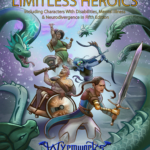Executive Functioning
You have trouble organizing yourself, including your thoughts, your possessions, your emotions, your time, and your memory. You have trouble making decisions about what to do next to the point of being unable to act on a choice at all. You have a −(IE) penalty on all initiative rolls, and on an initiative roll of 1 or less (or a natural 1), you cannot use your action or bonus action for the first round due to indecision, but you can still use your reaction. In some cases, you may have trouble transitioning unexpectedly to a new task or changing plans. You have a −(IE) penalty on your passive Wisdom (Perception) to determine surprise, and if the plans for the day change, you must succeed on a DC 8 + (IE) Constitution saving throw or have disadvantage on all Wisdom and Charisma checks for (IE)d4 minutes while you mentally adapt to your new circumstances and plans. On any attempt to find something that you previously possessed, you have a −(IE) penalty on Wisdom (Perception) checks to find it. You have a −(IE) penalty on all reaction ability checks, saving throws, and attack rolls. Because you’re used to having to compensate for your decision-making, you have developed creativity and resilience, so once per day, when making a non-combat ability check, you can choose to do so with advantage. Multiple days in a row with high stress or demands can temporarily increase the IE. If you have multiple traits, you may choose Attention Difference, Amplified Emotion (Uncomfortable), Diminished Motivation, or Amnesia (Anterograde) as one or more of them.
Real-world Examples
Attention Deficit Hyperactivity Disorder, Dementia, Depression, Obsessive-Compulsive Disorder, Schizophrenia, Autism
Assistive Options
Planning ahead helps organize thoughts, breaking down the upcoming days into manageable chunks of time. The party should do what they can to develop strategies for the future. Any situation that has been anticipated and planned accordingly reduces IE by 1 for that situation as you implement strategies to keep track of everything.
Magical Assistance
When the Haste spell is used on you, you can choose whether to gain the usual benefits or instead to reduce your IE by 2. The Foresight spell can also be used in this way with its longer duration, but casters may be unwilling to use a ninth-level spell slot for this purpose. A Handy Haversack can help you organize some possessions (if that’s where you put them).
